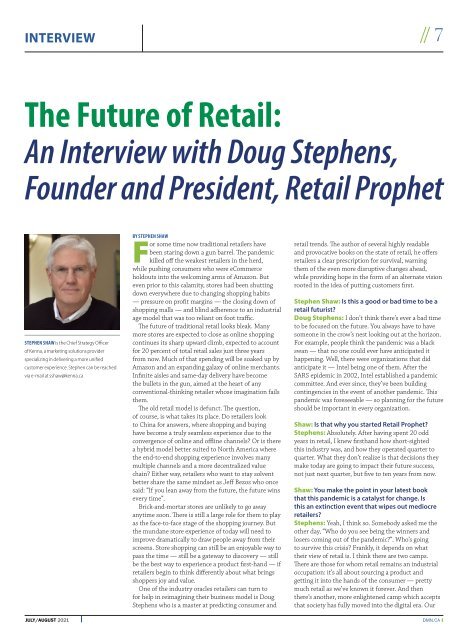Create successful ePaper yourself
Turn your PDF publications into a flip-book with our unique Google optimized e-Paper software.
INTERVIEW<br />
// 7<br />
The Future of Retail:<br />
An Interview with Doug Stephens,<br />
Founder and President, Retail Prophet<br />
STEPHEN SHAW is the Chief Strategy Officer<br />
of Kenna, a marketing solutions provider<br />
specializing in delivering a more unified<br />
customer experience. Stephen can be reached<br />
via e-mail at sshaw@kenna.ca<br />
BY STEPHEN SHAW<br />
For some time now traditional retailers have<br />
been staring down a gun barrel. The pandemic<br />
killed off the weakest retailers in the herd,<br />
while pushing consumers who were eCommerce<br />
holdouts into the welcoming arms of Amazon. But<br />
even prior to this calamity, stores had been shutting<br />
down everywhere due to changing shopping habits<br />
— pressure on profit margins — the closing down of<br />
shopping malls — and blind adherence to an industrial<br />
age model that was too reliant on foot traffic.<br />
The future of traditional retail looks bleak. Many<br />
more stores are expected to close as online shopping<br />
continues its sharp upward climb, expected to account<br />
for 20 percent of total retail sales just three years<br />
from now. Much of that spending will be soaked up by<br />
Amazon and an expanding galaxy of online merchants.<br />
Infinite aisles and same-day delivery have become<br />
the bullets in the gun, aimed at the heart of any<br />
conventional-thinking retailer whose imagination fails<br />
them.<br />
The old retail model is defunct. The question,<br />
of course, is what takes its place. Do retailers look<br />
to China for answers, where shopping and buying<br />
have become a truly seamless experience due to the<br />
convergence of online and offline channels? Or is there<br />
a hybrid model better suited to North America where<br />
the end-to-end shopping experience involves many<br />
multiple channels and a more decentralized value<br />
chain? Either way, retailers who want to stay solvent<br />
better share the same mindset as Jeff Bezos who once<br />
said: “If you lean away from the future, the future wins<br />
every time”.<br />
Brick-and-mortar stores are unlikely to go away<br />
anytime soon. There is still a large role for them to play<br />
as the face-to-face stage of the shopping journey. But<br />
the mundane store experience of today will need to<br />
improve dramatically to draw people away from their<br />
screens. Store shopping can still be an enjoyable way to<br />
pass the time — still be a gateway to discovery — still<br />
be the best way to experience a product first-hand — if<br />
retailers begin to think differently about what brings<br />
shoppers joy and value.<br />
One of the industry oracles retailers can turn to<br />
for help in reimagining their business model is Doug<br />
Stephens who is a master at predicting consumer and<br />
retail trends. The author of several highly readable<br />
and provocative books on the state of retail, he offers<br />
retailers a clear prescription for survival, warning<br />
them of the even more disruptive changes ahead,<br />
while providing hope in the form of an alternate vision<br />
rooted in the idea of putting customers first.<br />
Stephen Shaw: Is this a good or bad time to be a<br />
retail futurist?<br />
Doug Stephens: I don’t think there’s ever a bad time<br />
to be focused on the future. You always have to have<br />
someone in the crow’s nest looking out at the horizon.<br />
For example, people think the pandemic was a black<br />
swan — that no one could ever have anticipated it<br />
happening. Well, there were organizations that did<br />
anticipate it — Intel being one of them. After the<br />
SARS epidemic in 2002, Intel established a pandemic<br />
committee. And ever since, they’ve been building<br />
contingencies in the event of another pandemic. This<br />
pandemic was foreseeable — so planning for the future<br />
should be important in every organization.<br />
Shaw: Is that why you started Retail Prophet?<br />
Stephens: Absolutely. After having spent 20 odd<br />
years in retail, I knew firsthand how short-sighted<br />
this industry was, and how they operated quarter to<br />
quarter. What they don’t realize is that decisions they<br />
make today are going to impact their future success,<br />
not just next quarter, but five to ten years from now.<br />
Shaw: You make the point in your latest book<br />
that this pandemic is a catalyst for change. Is<br />
this an extinction event that wipes out mediocre<br />
retailers?<br />
Stephens: Yeah, I think so. Somebody asked me the<br />
other day, “Who do you see being the winners and<br />
losers coming out of the pandemic?”. Who’s going<br />
to survive this crisis? Frankly, it depends on what<br />
their view of retail is. I think there are two camps.<br />
There are those for whom retail remains an industrial<br />
occupation: it’s all about sourcing a product and<br />
getting it into the hands of the consumer — pretty<br />
much retail as we’ve known it forever. And then<br />
there’s another, more enlightened camp which accepts<br />
that society has fully moved into the digital era. Our<br />
JULY/AUGUST <strong>2021</strong><br />
<strong>DM</strong>N.CA ❰

















